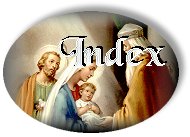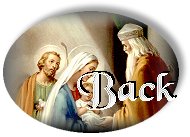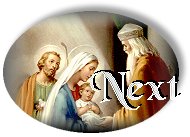IV
THE
DIMENSIONS OF THE FORMATION
OF PERMANENT DEACONS
1. Human formation
-
66. The scope of human formation is that of moulding the
personality of the sacred ministers in such a way that they become "a bridge
and not an obstacle for others in their meeting with Jesus Christ the Redeemer
of man".(77) Accordingly they must be educated to acquire and perfect a
series of human qualities which will permit them to enjoy the trust of
the community, to commit themselves with serenity to the pastoral ministry,
to facilitate encounter and dialogue.
Similar to the indications of Pastores dabo vobis
for the formation of priests, candidates for the diaconate, too, must be
educated "to love the truth, to be loyal, to respect every person, to have
a sense of justice, to be true to their word, to be genuinely compassionate,
to be men of integrity and, especially, to be balanced in judgement and
behaviour".(78)
-
67. Of particular importance for deacons, called to be
men of communion and service, is the capacity to relate to others. This
requires that they be affable, hospitable, sincere in their words and heart,
prudent and discreet, generous and ready to serve, capable of opening themselves
to clear and brotherly relationships, and quick to understand, forgive
and console.(79) A candidate who was excessively closed in on himself,
cantankerous and incapable of establishing meaningful and serene relationships
with others must undergo a profound conversion before setting off with
conviction on the path of ministerial service.
-
68. At the root of the capacity to relate to others is
affective maturity, which must be attained with a wide margin of certainty
in both celibate and married candidates. Such a maturity presupposes in
both types of candidate the discovery of the centrality of love in their
own lives and the victorious struggle against their own selfishness. In
reality, as Pope John Paul II wrote in the Encyclical Redemptor hominis,
"man cannot live without love. He remains a being that is incomprehensible
for himself, his life is senseless, if love is not revealed to him, if
he does not encounter love, if he does not experience it and make it his
own, if he does not participate intimately in it".(80) As the Pope explains
in Pastores dabo vobis, this is a love which involves all the aspects of
the person, physical, psychological and spiritual and which therefore demands
full dominion over his sexuality, which must become truly and fully personal.(81)
For celibate candidates, to live love means offering
the totality of one's being, of one's energies and readiness, to Christ
and the Church. It is a demanding vocation, which must take into account
the inclinations of affectivity and the pressures of instinct and which
therefore requires renunciation, vigilance, prayer and fidelity to a precise
rule of life. A decisive assistance can come from the presence of true
friends, who represent a precious help and a providential support in living
out one's own vocation.(82)
For married candidates, to live love means offering
themselves to their spouses in a reciprocal belonging, in a total, faithful
and indissoluble union, in the likeness of Christ's love for his Church;
at the same time it means welcoming children, loving them, educating them
and showing forth to the whole Church and society the communion of the
family. Today, this vocation is being hard tested by the worrying degradation
of certain fundamental values and the exaltation of hedonism and a false
conception of liberty. To be lived out in all its fullness, the vocation
to family must be nourished by prayer, the liturgy and a daily offering
of self.(83)
-
69. A pre-condition for an authentic human maturity is
training in freedom, which is expressed in obedience to the truth of one's
own being. "Thus understood, freedom requires the person to be truly master
of himself, determined to fight and overcome the different forms of selfishness
and individualism which threaten the life of each one, ready to open out
to others, generous in dedication and service to one's neighbor".(84) Training
in freedom also includes the education of the moral conscience, which prepares
one to listen to the voice of God in the depths of one's heart and to adhere
closely to it.
-
70. These many aspects of human maturity—human qualities,
ability to relate, affective maturity, training in freedom and education
of the moral conscience—must be considered, taking into account the age
and previous formation of the candidates, when planning programmes tailored
to the individual. The director of formation and the tutor will contribute
in the area of their competence; the spiritual director will take these
aspects into consideration and check them during spiritual direction. Encounters
and conferences which encourage development and give some incentive to
maturity are also of use. Community life—in the various forms in which
it can be programmed—will constitute a privileged forum for fraternal checks
and correction. In those cases where it may be necessary, in the judgement
of the formators, and with the consent of the individual concerned, recourse
may be made to a psychological consultation.
2. Spiritual formation
-
71. Human formation leads to and finds its completion
in spiritual formation, which constitutes the heart and unifying centre
of every Christian formation. Its aim is to tend to the development of
the new life received in Baptism.
When a candidate begins the path of formation for
the diaconate, generally he has already had a certain experience of the
spiritual life, such as, recognition of the action of the Spirit, listening
to and meditating upon the Word of God, the thirst for prayer, commitment
to service of the brothers and sisters, willingness to make sacrifices,
the sense of the Church, apostolic zeal. Also, according to his state of
life, he will already have matured a certain defined spirituality: of the
family, of consecration in the world or of consecration in the religious
life. The spiritual formation of the future deacon, therefore, cannot ignore
this experience which he has already had, but must seek to affirm and strengthen
it, so as to impress upon it the specific traits of diaconal spirituality.
-
72. The element which most characterises diaconal spirituality
is the discovery of and sharing in the love of Christ the servant, who
came not to be served but to serve. The candidate must therefore be helped
progressively to acquire those attitudes which are specifically diaconal,
though not exclusively so, such as simplicity of heart, total giving of
self and disinterest for self, humble and helpful love for the brothers
and sisters, especially the poorest, the suffering and the most needy,
the choice of a life-style of sharing and poverty. Let Mary, the handmaid
of the Lord, be present on this journey and be invoked as mother and auxiliatrix
in the daily recitation of the Rosary.
-
73. The source of this new capacity to love is the Eucharist,
which, not by chance, characterizes the ministry of the deacon. In fact,
service of the poor is the logical consequence of service of the altar.
Therefore the candidate will be invited to participate every day, or at
least frequently, within the limits of his family and professional commitments,
in the celebration of the Eucharist and will be helped to penetrate ever
deeper into its mystery. Within the context of this Eucharistic spirituality,
care will be taken to give adequate appreciation to the sacrament of Penance.
-
74. Another characteristic element of diaconal spirituality
is the Word of God, of which the deacon is called to be an authoritative
preacher, believing what he proclaims, teaching what he believes, living
what he teaches.(85) The candidate must therefore learn to know the Word
of God ever more deeply and to seek in it constant nourishment for his
spiritual life by means of its loving and thorough study and the daily
exercise of lectio divina.
-
75. There should also be an introduction to the meaning
of the Prayer of the Church. Indeed praying in the name of the Church and
for the Church is part of the ministry of the deacon. This requires a reflection
on the uniqueness of Christian prayer and the meaning of the Liturgy of
the Hours, but especially a practical initiation into it. To this end,
it is important that time be dedicated to this prayer during all meetings
of the future deacons.
-
76. Finally, the deacon incarnates the charism of service
as a participation in the ministry of the Church. This has important repercussions
on his spiritual life, which must be characterized by obedience and fraternal
communion. A genuine education in obedience, instead of stifling the gifts
received with the grace of ordination, will ensure ecclesial authenticity
in the apostolate. Communion with his ordained confreres is also a balm
for supporting and encouraging generosity in the ministry. The candidate
must therefore be educated to a sense of belonging to the body of ordained
ministers, to fraternal collaboration with them and to spiritual sharing.
-
77. The means for this formation are monthly retreats
and annual spiritual exercises; instructions, to be programmed according
to an organic and progressive plan, which takes account of the various
stages of the formation; and spiritual accompaniment, which must be constant.
It is a particular task of the spiritual director to assist the candidate
to discern the signs of his vocation, to place himself in an attitude of
ongoing conversion, to bring to maturity the traits proper to the spirituality
of the deacon, drawing on the writings of classical spirituality and the
example of the saints, and to bring about a balanced synthesis of his state
of life, his profession and the ministry.
-
78. Moreover, provision should be made that wives of married
candidates may grow in awareness of their husbands' vocation and their
own mission at his side. They are to be invited, therefore, to participate
regularly in the spiritual formation meetings.
Appropriate efforts should also be directed towards
educating children about the ministry of the deacon.
3. Doctrinal formation
-
79. Intellectual formation is a necessary dimension of
diaconal formation insofar as it offers the deacon a substantial nourishment
for his spiritual life and a precious instrument for his ministry. It is
particularly urgent today, in the face of the challenge of the new evangelization
to which the Church is called at this difficult juncture of the millennium.
Religious indifference, obscuring of values, loss of ethical convergence,
and cultural pluralism demand that those involved in the ordained ministry
have an intellectual formation which is complete and serious.
In the Circular Letter of 1969, Come è a conoscenza,
the Congregation for Catholic Education invited Episcopal Conferences to
prepare a doctrinal formation for candidates to the diaconate which would
take account of the different situations, personal and ecclesial, yet at
the same time would absolutely exclude "a hurried or superficial preparation,
because the duties of the Deacon, as laid down in the Constitution Lumen
gentium (n. 29) and in the Motu Proprio (n. 22),(86) are of such importance
as to demand a formation which is solid and effective".
-
80. The criteria which must be followed in preparing this
formation are:
-
a) necessity for the deacon to be able to explain his
faith and bring to maturity a lively ecclesial conscience;
-
b) attention to his formation for the specific duties
of his ministry;
-
c) importance of acquiring the capacity to read a situation
and an adequate inculturation of the Gospel;
-
d) usefulness of knowing communication techniques and
group dynamics, the ability to speak in public, and to be able to give
guidance and counsel.
-
81. Taking account of these criteria, the following contents
must be taken into consideration: (87)
-
a) introduction to Sacred Scripture and its right interpretation;
the theology of the Old and New Testament; the interrelation between Scripture
and Tradition; the use of Scripture in preaching, catechesis and pastoral
activity in general;
-
b) introduction to the study of the Fathers of the Church
and an elementary knowledge of the history of the Church;
-
c) fundamental theology, with illustration of the sources,
topics and methods of theology, presentation of the questions relating
to Revelation and the formulation of the relationship between faith and
reason, which will enable the future deacons to explain the reasonableness
of the faith;
-
d) dogmatic theology, with its various treatises: Trinity,
creation, Christology, ecclesiology and ecumenism, mariology, Christian
anthropology, sacraments (especially theology of the ordained ministry),
eschatology;
-
e) Christian morality, in its personal and social dimensions
and, in particular, the social doctrine of the Church;
-
f) spiritual theology;
-
g) liturgy;
-
h) canon law.
According to particular situations and needs, the programme
of studies will be integrated with other disciplines such as the study
of other religions, philosophical questions, a deepening of certain economic
and political problems.(88)
-
82. For theological formation, use may be made, where
possible, of institutes of religious sciences which already exist or of
other institutes of theological formation. Where special schools for the
theological formation of deacons must be instituted, this should be done
in such a way that the number of hours of lectures and seminars be not
less than a thousand in the space of the three years. The fundamental courses
at least are to conclude with an examination and, at the end of the three
years there is to be a final comprehensive examination.
-
83. For admission to this programme of formation, a previous
basic formation is required; this is to be determined according to the
cultural situation of the country.
-
84. Candidates should be predisposed to continuing their
formation after ordination. To this end, they are encouraged to establish
a small personal library with a theological-pastoral emphasis and to be
open to programmes of ongoing formation.
4. Pastoral formation
-
85. In the wide sense, pastoral formation coincides with
spiritual formation: it is formation for an ever greater identification
with the diakonia of Christ. This attitude must guide the articulation
of the various aspects of formation, integrating them within the unitary
perspective of the diaconal vocation, which consists in being a sacrament
of Christ, servant of the Father.
In the strict sense, pastoral formation develops by
means of a specific theological discipline and a practical internship.
-
86. This theological discipline is called pastoral theology.
It is "a scientific reflection on the Church as she is built up daily,
by the power of the Spirit, in history; on the Church as the 'universal
sacrament of salvation', as a living sign and instrument of the salvation
wrought by Christ through the word, the sacraments and the service of charity".(89)
The scope of this discipline, therefore, is the presentation of the principles,
the criteria and the methods which guide the apostolic-missionary work
of the Church in history.
The pastoral theology programmed for the deacons will
pay particular attention to those fields which are eminently diaconal,
such as:
-
a) liturgical praxis: administration of the sacraments
and sacramentals, service at the altar;
-
b) proclamation of the Word in the varied contexts of
ministerial service: kerygma, catechesis, preparation for the sacraments,
homily;
-
c) the Church's commitment to social justice and charity;
-
d) the life of the community, in particular the guidance
of family teams, small communities, groups and movements, etc.
Certain technical subjects, which prepare the candidates
for specific ministerial activities, can also be useful, such as psychology,
catechetical pedagogy, homiletics, sacred music, ecclesiastical administration,
information technology, etc.(90)
-
87. At the same time as (and possibly in relationship
with) the teaching of pastoral theology a practical internship should be
provided for each candidate, to permit him to meet in the field what he
has learned in his study. It must be gradual, tailored to the individual
and under continual supervision. For the choice of activities, account
should be taken of the instituted ministries received, and their exercise
should be evaluated.
Care is to be taken that the candidates be actively
introduced into the pastoral activity of the diocese and that they have
periodic sharing of experiences with deacons already involved in the ministry.
-
88. In addition, care should be taken that the future
deacons develop a strong missionary sensitivity. In fact, they too, in
an analogous way to priests, receive with sacred ordination a spiritual
gift which prepares them for a universal mission, to the ends of the earth
(cf Acts 1:8).(91) They are to be helped, therefore, to be strongly aware
of their missionary identity and prepared to undertake the proclamation
of the truth also to non-Christians, particularly those belonging to their
own people. However, neither should the prospect of the mission ad gentes
be lacking, wherever circumstances require and permit it.




